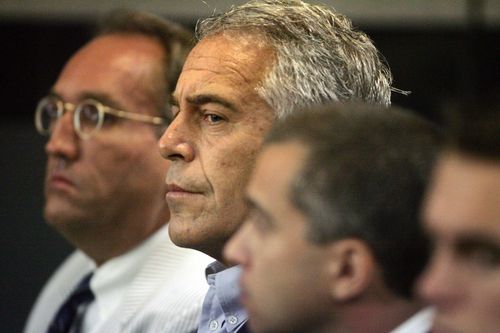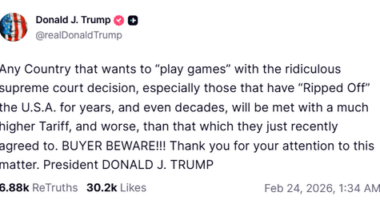Share this @internewscast.com
The upcoming week is poised to bring a pivotal moment that U.S. House Speaker Mike Johnson has been delaying for almost four months: the House’s decision on whether to make the Jeffrey Epstein files public.
Back in late July, Johnson dismissed the House for a five-week recess a day earlier than planned to quell a burgeoning Republican uprising. Following this, he prolonged the House’s absence during the shutdown, which, whether intentional or not, conveniently allowed him to avoid swearing in the critical 218th member necessary to initiate the vote.
Former President Donald Trump also appeared to be against this vote. He made a last-ditch effort on Wednesday to sway the small group of Republicans who endorsed the “discharge petition,” but his attempts did not succeed.

Now, the vote is imminent, with Johnson revealing plans to schedule it for next week. So, what lies ahead? What implications could this vote have, and how might it influence the political landscape?
While this is not the conclusion of the Epstein saga, it marks a crucial juncture that could lead the narrative in a new direction.
It’s important to recognize that this vote is not the final step. Passing the bill in the House does not instantly oblige the Justice Department to divulge the complete Epstein case files. The proposal must still clear the Senate and receive the president’s signature to become effective.
But there’s clearly a reason Johnson and the administration didn’t want the vote. The fear here seems to be that it 1) creates a very difficult decision for many Republican congressmembers, and it 2) could apply pressure on the Senate and the administration to follow suit â particularly if it passes by a large margin in the House.


And the large margin appears to be what many are anticipating. CNN reported this week that House GOP leadership is expecting mass defections. The lead GOP co-sponsor of the discharge petition, Representative Thomas Massie of Kentucky, isn’t exactly lowering expectations, either. He has set a threshold for success at two-thirds of the House, or nearly 290 votes, if all members are present. That’s the point at which enough members support the measure that it could overcome a presidential veto.
“If we are somehow able to get two-thirds vote here in the House, [that] puts a lot of pressure on the Senate, and also, if the Senate does pass it, that’s a very serious step for the president,” Massie told CNN.
That would indeed be a very symbolic victory. It would not only demonstrate that a wide, bipartisan majority of the House wants the files released, but it would suggest the chamber could actually override Trump’s attempt to block that â whether or not it would ever come to that.
It would require about 75 out of the 219 House Republicans, if every Democrat voted in favour.


Several Republicans have already said they will vote for the bill, despite not having supported Massie’s discharge petition. (Only four Republicans signed the petition.)
And we’re also seeing how this all could start to register in the Senate, with Senator John Kennedy of Louisiana quickly signalling on Thursday that the GOP should just go for full transparency. Kennedy had previously voted against an early effort by Senate Democrats to force the release of the files.
“I just don’t think this issue is going to go away until that issue is addressed and answered to the American people’s satisfaction,” Kennedy told CNN’s Kasie Hunt. “And I may end up with a sombrero on my head for saying that, but that’s the way I see it.”
These House members clearly face a difficult vote, with compelling dynamics pushing them in both directions.
Among the dynamics pushing them to vote no is loyalty to Trump, which is the coin of the realm in today’s GOP. Trump has made it very clear that he will remember how these members vote.
“Only a very bad, or stupid, Republican would fall into that trap,” Trump posted on Wednesday on social media. He added that there “should be no deflections to Epstein or anything else”.

Voting for the bill would be a significant rebuke of Trump and Johnson, who explicitly fought against this. It would suggest that the other measures taken â such as the House Oversight Committee’s release of some Epstein materials obtained from his estate â just weren’t good enough. Congressional Republicans almost never buck Trump like this.
GOP leadership also has reason to try and limit defections, because of the level of pressure it could apply to the Senate.
But on the other side are plenty of dynamics pressuring members to vote for the bill.
The big one is how they would explain the vote to their constituents. The fact is that Americans overwhelmingly want all the files, they’re upset with the lack of transparency thus far, and they expect that the files contain significant information.
Fully 77 per cent of Americans wanted all the files released, as long as victims’ names are redacted, according to an NPR-PBS-Marist College poll in September. An earlier CBS News-YouGov poll showed 89 per cent said the government should release all its information.

Other polling has shown overwhelming majorities of Americans think damaging information about powerful people is contained in the files and that the government hasn’t been transparent enough.
Given all of that, voting against releasing the records risks making you look like you’re part of a cover-up â a cover-up for pedophilia. And what if the stuff is actually going to come out anyway, and maybe even includes some significant information? Who wants to be one of the people who voted against that transparency?
And that gets at another key dynamic here. At some point, Republicans who once upon a time led the charge to release the Epstein files â at least until the Trump administration reversed itself this summer â might just reason this is going to happen the easy way or the hard way.

CNN’s Annie Grayer and Kristen Holmes reported on Friday on a Trump ally on Capitol Hill who told the president directly that they questioned the strategy to keep delaying and downplaying things.
At some point, politicians might resent that the administration has so mishandled all of this, and view this vote as a chance to force the issue and hopefully get beyond all of it, after months of it looming over their heads.
Whatever the case, it’ll be one of the more fascinating votes in a long time.













